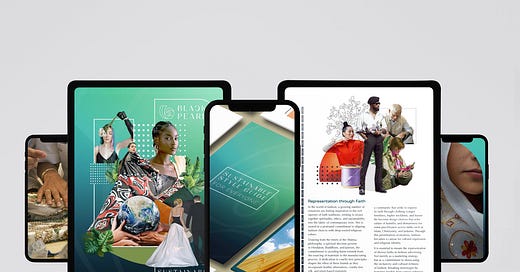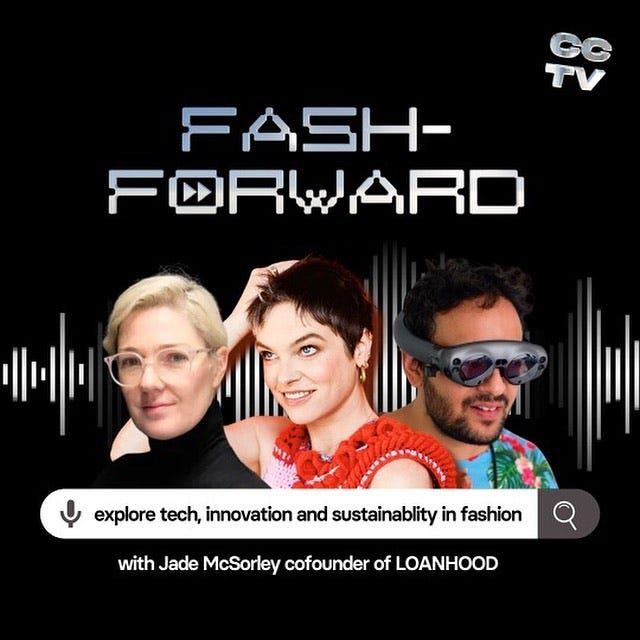March in Fashion, Condensed.
A plastic-free fur alternative under the microscope, fashion has cancelled cancelling, and could open sourcing be the answer to scaling innovation in fashion and footwear?
Hello there,
In March, I met the founder of a footwear brand who decided to open source the intellectual property for her best-selling shoe, the Weekend Boot.
It is a bold move for Thesus, a small brand that celebrated its 10th anniversary with an open letter to the industry. In it, founder Sofi Khwaja explained her thinking behind the potentially brand-altering decision: in the last 10 years, the world of fashion and footwear has made few improvements towards reducing its impact. With the right information at their fingertips, global brands might just be able to move the needle.
Sofi’s hope is that by open-sourcing the information Thesus has gathered during its 10 years, bigger brands will tap into this resource to improve their supply chains, invest in better materials, and make more responsible design and buying decisions.
On the Thesus website, anyone can now access the Weekend Boot’s materials index, tech pack, suppliers list, design process, plus details of the factory and agents used to make these 96% renewable and recycled material hiking boots.
Open sourcing is pretty rare in an industry that is practically allergic to collaboration and fiercely guards its IP out of fear of copycats. For decades, brands thought that transparency of supplier lists, manufacturers and materials would destroy their competitive advantage. It’s only in recent years, brought on by the ESG reckoning, that they have started to accept that sharing information and collaborating to find and fund solutions will actually benefit everyone. The result is usually things like Multi Stakeholder Initiatives that recognise the truth in the phrase ‘a rising tide lifts all boats.’
For me, it brings up the question: should it be an ethical obligation to open source innovation for the betterment of the whole industry? We need to urgently scale innovations that actually work, and as we saw with Renewcell, that is a fragile process which requires huge industry uptake and investment. Open sourcing is an altruistic means of doing this — but altruism and capitalism don’t exactly go hand-in-hand. Understandably, the unknown impact on revenue will undoubtedly hold 99% of companies back from pursuing this path.
Allbirds, the footwear brand made famous by its wool sneakers, comes to mind as one of the few companies that has been open sourcing information in recent years. In 2021, Allbirds open sourced information on its Sweetfoam® shoe sole made from sugarcane and in 2023, it open sourced the toolkit to make its “zero-carbon” Moonshot shoe.
I will be very interested to see how Thesus’ open sourcing journey impacts the business — Sofi herself wasn’t sure what the outcome would be — but perhaps it will inspire more innovative and brave brands to follow suit. I’ve leave you with this call to action from the Thesus open letter to global brands:
“We ask you to take our IP and use it. Amplify and accelerate our impact. Make it an industry norm, not an exception. You have the scale, reach, and means to do it. We are acutely aware that as a small and niche brand (in the torrents of the most volatile retail climate in our time) we can’t do this alone. As an industry, we have to propel these ideals forward. This can only happen if we use our imaginations and do it together.”
You can read more about Thesus’ open sourcing decision in the Fast Company article below.
Until next month,
Meg
Things I Didn’t Write
The Lingering Cost of Instant Fashion by Kenneth Pucker for Harvard Business Review
Has Fashion Canceled Canceling? by Vanessa Friedman for the New York Times
The Vicuñas And The $9,000 Sweater by Marcelo Rochabrun for Bloomberg
Why Are Sustainability-Focused Designers Mostly Women? by Rachel Cernansky for Vogue Business
How Fashion Works: A Dive Into Supply Chains & The State Of Fashion by Heather Snowden for Remake
Why This Shoe Brand Just Gave Away The Blueprint For Its Best-Selling Boot by Elizabeth Segran for Fast Company
Jeremy Hunt And Gen Z Are Clearly Of A Mind On Shein. They’d Rather Skirt The Issues by Catherine Bennett for The Guardian
Can BioFluff Succeed at Replacing Real Fur With its Plastic-Free Alternative? by Olivia Baba for EcoCult
Is Humanity Out of Fashion? by Vanessa Friedman for the New York Times
The To-Do List
Fashion Revolution Week 2024
April means Fashion Revolution Week and this year it’s the 10th anniversary of this industry-leading advocacy organisation. As always, not matter where you live there are Fashion Revolution activations to get involved in. You can also find social media assets, guides and more on the Fash Rev website.
Fash Forward Podcast with Jade McSorley: Fixing the Fashion Industry Through AI and Social Innovation
This new podcast by Loanhood founder Jade McSorley for Clean Cut TV starts with a fascinating episode featuring my friends Brooke Roberts-Islam, one of the most rigorous sustainability journalists I know, and her husband Moin Roberts-Islam, who is an expert in future fashion technology and innovation.
The Sustainable Style Guide for Everyone by Black Pearl Consultancy
Sustainable fashion entrepreneur Samata Pattinson has launched her consultancy, Black Pearl along with the Sustainable Style Guide for Everyone. It’s a free downloadable guide for embracing sustainable fashion in every day life.
US subscribers (and those with HBO)! A new HBO documentary BrandyHellville & the Cult of Fast Fashion is out on the 9th of April. If you’re not familiar with Brandy Melville, it’s a teen clothing brand that only makes one size of clothing. Turns out that’s only the tip of the fucked-up iceberg with this company. This should be a very interesting watch courtesy of the teams at Remake, the OR Foundation and Textile Exchange.








